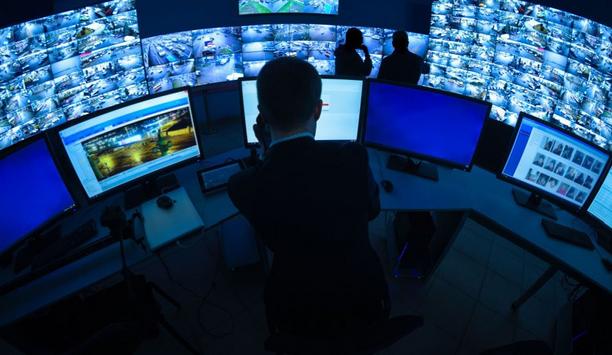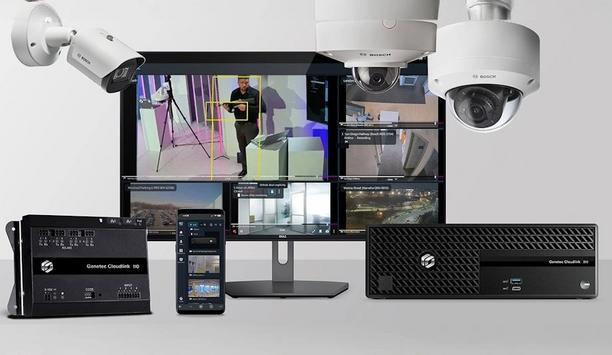Video surveillance - Round table discussions
While unpacking our bags from a trade show, it is interesting to consider the dominant themes and trends we heard and saw at the show. So it is with the recently concluded Global Security Exchange (GSX) show in Chicago, presented by ASIS International. Amid all the product promotion, training sessions, networking and tired feet at the show, what really stood out? We asked this week’s Expert Panel Roundtable: What was the big news at the GSX 2019 trade show in Chicago?
Video analytics are undergoing a fundamental change in the market as machine learning enhances their accuracy while expanding their capabilities. But what are those expanded capabilities and how are they impacting the operation of security and video systems? We asked this week’s Expert Panel Roundtable: What new video analytics are having an impact in the market and how?
Fire and security systems are two elements of the same mission: To keep buildings and their occupants safe. However, the two systems often operate independently and may not be integrated. Should there be more integration and what are the pitfalls? We asked this week’s Expert Panel Roundtable: What are the challenges and opportunities of integrating security and fire systems?
The new school year is a good time to reflect on the role of security in protecting our schools. From video to access control to some newer technologies, our Expert Panel Roundtable found plenty to talk about when we asked this week’s question: How does security technology make our schools safer?
One impact of Chinese companies entering the physical security market has been an erosion in product pricing, creating what has been called the "race to the bottom". However, political forces and cybersecurity concerns have presented new challenges for Chinese companies. Adding cybersecurity increases costs, and the addition of more functionality to edge devices is another trend that has impacted product pricing. We asked this week's Expert Panel Roundtable: Has price erosion ended (or slowed do...
Artificial intelligence is on the verge of changing the face of multiple industries – from healthcare to entertainment to finance, from data security to manufacturing to the cars we drive (or that will drive themselves!) In the physical security market, AI has garnered a lot of attention as a buzzword and as a harbinger of things to come. We asked this week's Expert Panel Roundtable: What security markets are most likely to embrace artificial intelligence (AI)?
In the digital age, software is a component of almost all systems, including those that drive the physical security market. A trend toward hardware commoditisation is making the role of software even more central to providing value to security solutions. Software developments make more things possible and drive innovation in the market. We asked this week's Expert Panel Roundtable: How do software improvements drive physical security?
When it comes to security and to ensuring the integrity of gaming operations, today’s casino market is risk-averse. Regulations direct the required surveillance of table games and slot machines, while modern casinos are often sprawling complexes that have a variety of other risks to be addressed, too. We asked this week’s Expert Panel Roundtable: What are the challenges of the casino market relating to security and surveillance technology?
There will be more artificial intelligence, more machine learning, video systems with more capabilities, and all of it will add greater value to our solutions. Those are among the expectations of our Expert Panel Roundtable as they collectively look ahead to the remainder of 2019. One unexpected prediction is that AI will not prove to be a game changer – at least not yet. We asked this week’s Expert Panel Roundtable: What will be the biggest surprise for security in the second half o...
People are an essential component of any physical security system. Automation hasn’t taken over completely yet! But how has innovation changed the skillsets security operators need to operate systems effectively? The two elements – technology and manpower – must operate seamlessly and hand-in-glove to ensure that modern systems live up to their full potential. We asked this week’s Expert Panel Roundtable: How does technology innovation in security systems impact the skill...
The ability to treat patients in a secure environment is a base requirement of hospitals and other healthcare facilities. Whether facilities are large or small, security challenges abound, including perimeter security, access control of sensitive areas, video surveillance, and even a long list of cyber-risks. We asked this week’s Expert Panel Roundtable: What are the security challenges of hospitals and the healthcare industry?
The definition of a standard is “an authoritative principle or rule that usually implies a model or pattern for guidance, by comparison with which the quantity, excellence, correctness, etc., of other things may be determined.” In technology markets, such as physical security, standards are agreed-upon language, specifications or processes that are used across the board by multiple stakeholders to enable easier interconnectivity and smoother operation of systems. We asked this week&r...
With the advent of online shopping, brick-and-mortar retail businesses are challenged to make transactions more convenient while enhancing the “experience” aspects that differentiate real-life shopping from the simpler route of clicking on a website. Technology is helping retailers create that differentiation, including technologies such as video systems, deep learning analytics and point-of-sale (POS) integrations that have evolved from innovation in the physical security market. Fo...
Cybersecurity has become the ultimate buzzword in the physical security market. And it also represents one of the industry’s most intractable challenges. Several years ago, the problem with cybersecurity was lack of awareness among physical security practitioners. It’s now safe to say that awareness has increased. Everyone today talks about cybersecurity, but has it helped the larger problem? We asked this week’s Expert Panel Roundtable: Is greater awareness helping to increase...
Technology advancements often come with new terms and definitions. The language of our marketplace evolves to include new words that describe innovations in the industry. In the skilled hands of marketers, terms intended to be descriptive can also take a new element of ‘buzz,’ often presaging exciting developments that will drive the future. We asked this week’s Expert Panel Roundtable: What new buzzword have you heard, and what does it mean for the industry?
Statistically speaking, incidents of terrorism are unlikely to impact most businesses and institutions. However, the mere possibility of worst-case-scenario attacks is enough to keep security professionals awake at night. Compounding the collective anxiety is the minute-by-minute media coverage when an attack does occur. The immediacy of the shared experience of global tragedy impacts us all – including security system decision-makers. We asked this week’s Expert Panel Roundtable: Ho...
ISC West 2019 is in the industry’s rear-view mirror, and what a show it was! The busy three days in April offered a preview of exciting technologies and industry trends for the coming year. We asked this week’s Expert Panel Roundtable: What was the big news at ISC West 2019?
The year ahead holds endless promise for the physical security industry, and much of that future will be determined by which technologies the industry embraces. The menu of possibilities is long – from artificial intelligence to the Internet of Things to the cloud and much more – and each technology trend has the potential to transform the market in its own way. We tapped into the collective expertise of our Expert Panel Roundtable to answer this question: What technology trend will...
Cybersecurity continues to be a major theme in the physical security industry, but effective cybersecurity comes at a cost. Higher cost is contrary to another major trend in the market: lower product pricing, which some have characterised as a ‘race to the bottom’. Chinese manufacturers, whose products tend to have lower prices, have been the target of cybersecurity concerns and even a government ban. So what is the overall impact of cybersecurity on pricing trends in video products?...
The new year 2019 is brimming with possibilities for the physical security industry, but will those possibilities prove to be good news or bad news for our market? Inevitably, it will be a combination of good and bad, but how much good and how bad? We wanted to check the temperature of the industry as it relates to expectations for the new year, so we asked this week’s Expert Panel Roundtable: How optimistic is your outlook for the physical security industry in 2019? Why?
The concept of how security systems can contribute to the broader business goals of a company is not new. It seems we have been talking about benefits of security systems beyond “just” security for more than a decade. Given the expanding role of technologies in the market, including video and access control, at what point is the term “security” too restrictive to accurately describe what our industry does? We asked the Expert Panel Roundtable for their responses to this p...
In today’s global economy, goods are manufactured all over the world and shipped to customers thousands of miles away. Where goods are manufactured thus becomes a mere detail. However, in the case of “Made in China”, the location of a manufacturer has become more high-profile and possibly more urgent. The U.S. government recently banned the use in government installations of video system components from two Chinese manufacturers, presumably because of cybersecurity concerns. A...
They say that every choice has a cost. It's a basic principle that, economically speaking, nothing is free. If it doesn't cost actual money, it may be expensive in terms of time, attention and/or effort. These are interesting observations to keep in mind as one peruses the various "free" video management system (VMS) offerings available on the market. Some are provided by camera companies to unify their products into a "system", even if it's a small one. Other free VMS offerings are entry-level...
In the simplest terms, video systems capture and record video. But supporting these basic operations are a growing number of other functions that expand usefulness and the ability to interact with related elements in a larger system. As video system functionality expands, we asked this week’s Expert Panel Roundtable: What is the most important function of a CCTV system and why?
There is no expectation of privacy in a public space. That’s the premise on which most video surveillance applications are justified. But new concerns about privacy, specifically the General Data Protection Regulation (GDPR) in Europe, are changing expectations. And what if a camera must be positioned where a private area happens to be within its range? Fortunately, there are technology approaches to solving these dilemmas, as our Expert Panellists explain. We asked: What new technologies...
Artificial intelligence (AI) is a current buzzword in the physical security market – and the subject of considerable hype. However, AI sometimes get negative press, too, including dire warnings of its potential and eventual impact from some of our most prominent technology thinkers. We decided to take the issue to our Expert Panel Roundtable with this week’s question: What are the negative impacts and/or new challenges of AI for physical security?
When is it too late to learn that a video camera isn’t working properly? As any security professional will tell you, it’s too late when you find that the system has failed to capture critical video. And yet, for many years, system administrators “didn’t know what they didn’t know.” And when they found out, it was too late, and the system failed to perform as intended. Fortunately, in today’s technology-driven networked environment, monitoring a system&rs...
Even the most advanced and sophisticated security systems are limited in their effectiveness by a factor that is common to all systems – the human factor. How effectively integrators install systems and how productively users interface with their systems both depend largely on how well individual people are trained. We asked this week’s Expert Panel Roundtable: What is the changing role of training in the security and video surveillance market?
The physical security industry is embracing the cloud in a big way. Cloud-based systems – which involve accessing a shared pool of information technology resources via the Internet – are much higher-profile in the video and access control markets, and large and small companies are getting on the cloud bandwagon. We asked this week's Expert Panel Roundtable: What factors are contributing to growth in cloud systems in the security market?
We are living in the age of Big Data, and businesses are inundated with large volumes of data every day. Success depends on capturing, analysing and ultimately transforming that data into information and intelligence that can be used to improve the business. So, it is with today's physical access control and video systems, too, which also generate unprecedented levels of data. But how can we make the data useful to end users and how can they realise its full value? We asked this week's Expert Pa...





































